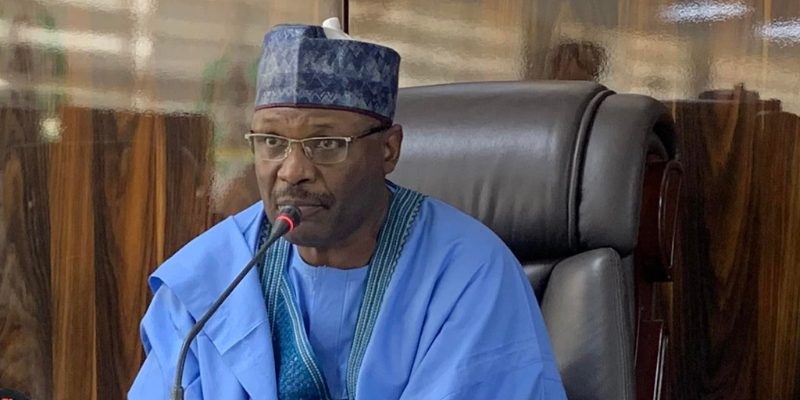Professor Mahmood Yakubu’s tenure began ten years ago in 2015. This followed his appointment by the late former President Muhammadu Buhari, who reappointed him for another five years in 2020. As he concluded his decade-long tenure as the chairman of Nigeria’s election commission, the narrative of his leadership is defined by the paradox of the Bimodal Voter Accreditation System (BVAS).
The introduction of the BVAS, the culmination of the Independent National Electoral Commission’s long-standing digital transformation drive, followed an earlier introduction of the automated fingerprint identification system in 2011, Smart Card Readers (SCR) in 2015, and the Z-pad in 2020.
On Saturday, September 11th, 2021, Yakubu’s team formally introduced the BVAS, an electronic device designed to curb electoral malpractice and enhance transparency. The device was first piloted in the Isoko South 1 State Constituency Bye-Election held in Delta State in 2021.
The BVAS performs a critical three-in-one function.
First, it serves as a voter enrolment device during the registration stage. At the voting stage, it performs the dual role of accrediting voters and transmitting the results to the Independent National Electoral Commission (INEC) Results Viewing Portal (IReV).
By using fingerprint and facial identity to prevent multiple or underage voting, the BVAS and IReV system was widely celebrated as the best chance to reduce the scope for manipulation. This reform was backed by its successful deployment in off-cycle governorship elections in Anambra, Ekiti, and Osun states.

Read also: FG integrates NIN into INEC voter registration for identity verification
The collapse of promised transparency in 2023
The lead-up to the 2023 general elections was marked by instability, setting a tense stage for a promised tech-powered transparency.
Though originally slated for February 16th, the election was postponed just hours before its commencement. Citing extensive logistical challenges, including difficulties in distributing materials on time and operational issues such as errors in mixing sensitive and non-sensitive materials, INEC postponed the poll.
Eventually, it held a week later on February 23rd, after the country had waited with bated breath.
Despite repeated assurances from the INEC chairman that the system would guarantee real-time and transparent upload of polling unit results, the technology’s messy performance during the 2023 General Elections made a mockery of the promised perfection.
By the evening of that day, as the results were meant to start populating the portal, the promised technological transparency collapsed, giving rise to widespread suspicion and distrust.
Read also: With 4.2m online voters pre-registrations, do Nigerian youths still trust INEC?


Prof. Yakubu officially bowed out on Tuesday, the 7th of October, handing over to May Agbamuche-Mbu, the National Commissioner, who served in an acting capacity for less than 48 hours, pending the appointment of a substantive chairperson.
At the handover event in Abuja, attended by other National Commissioners and Resident Electoral Commissioners (RECs), Mr Yakubu appreciated his colleagues and staff, urging them to extend the same support to his successor.
“I will forever cherish the support of successive Secretaries and staff of the Commission nationwide,” adding that “Together, we innovated and managed the commission’s enormous responsibilities, sometimes on the verge of breaking down,” Prof. Yakubu said.
For some analysts, while the BVAS technology itself wasn’t entirely new, Nigeria and over 25 other African countries have increasingly turned to digital solutions for election problems. Its implementation at scale under Professor Yakubu’s leadership resulted in a paradox of achievement and failure.
The BVAS remains a defining and complex element of Mahmood Yakubu’s legacy. However, the controversy surrounding its inconsistent use and the failure of the accompanying IReV portal represent a symbol of an opportunity lost and also a testament to the modernisation achieved under his chairmanship.








